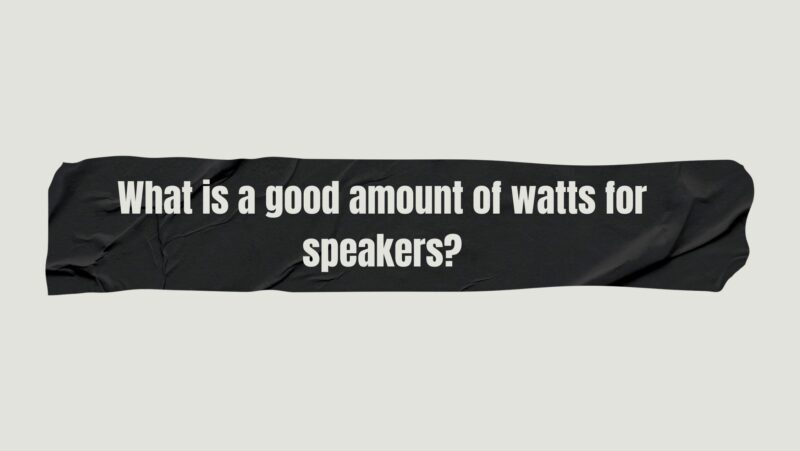The quest for the ideal wattage for speakers is a perpetual journey for audiophiles and music enthusiasts alike. The right amount of wattage is a crucial determinant of audio quality, volume, and overall performance. However, the answer to what constitutes a good amount of watts for speakers is far from one-size-fits-all. It is influenced by numerous factors, including the intended use, room size, speaker efficiency, and personal preferences. This article delves deep into the intricate world of speaker wattage, unraveling the considerations that guide the choice of wattage for an optimal audio experience.
Understanding Speaker Wattage
Before delving into the ideal wattage, it’s imperative to grasp the essence of speaker wattage. Wattage signifies the power handling capacity of a speaker, indicating the maximum power it can handle without distortion or damage. In the audio realm, speakers and amplifiers must be compatible in terms of power, with the amplifier’s output power aligning with the speaker’s power handling capability.
Factors Influencing Ideal Wattage
- Room Size and Acoustics: The dimensions and acoustic properties of the listening room play a significant role in determining the ideal wattage. Larger rooms necessitate speakers with higher wattage to adequately fill the space with sound and maintain audio fidelity.
- Intended Use: The purpose for which the speakers will be used dictates the necessary wattage. For instance, speakers used in a home theater might require different wattage compared to those used in a studio monitoring setup or for outdoor events.
- Speaker Sensitivity: Sensitivity refers to the efficiency of speakers in converting electrical power into sound output. More sensitive speakers require less power to achieve the same volume as less sensitive counterparts. This means that high-sensitivity speakers might not need as much wattage as low-sensitivity ones.
- Listening Preferences: Personal listening preferences also impact the desired wattage. Some individuals prefer listening at lower volumes with emphasis on clarity and detail, while others seek higher volumes with a focus on power and impact.
- Music Genre and Content: The type of music being played matters. Music with dynamic shifts, deep bass, and intricate details might demand higher wattage for accurate reproduction.
- Speaker Quality: The quality of the speakers and their components also influences the required wattage. High-quality speakers with advanced drivers and construction can often deliver better performance at lower wattage levels.
Recommended Wattage Ranges
- Low to Mid-Wattage (10-50W): These wattage ranges are suitable for personal listening setups, small rooms, and scenarios where clarity at moderate volumes is paramount. They work well for acoustic genres, podcasts, and casual listening.
- Mid to High-Wattage (50-150W): This range is versatile, catering to medium-sized rooms, home theaters, and gatherings. It strikes a balance between clarity and volume, making it suitable for a wide array of music genres and audio content.
- High-Wattage (150W and above): High-wattage speakers are geared towards larger spaces, events, and situations where high sound pressure levels are essential. They excel in delivering powerful audio experiences but might be overkill for smaller setups.
Balancing Power and Quality
While higher wattage speakers often equate to more power and volume, it’s important to note that raw wattage alone does not guarantee better audio quality. The synergy between amplifier power, speaker sensitivity, and the listener’s preferences contributes to the overall experience. A high-wattage speaker paired with a low-quality amplifier might result in distorted audio, while a well-matched combination can yield exceptional results even with lower wattage.
Conclusion
The quest for the ideal wattage for speakers is a dynamic journey that depends on a multitude of factors. From room acoustics and intended use to sensitivity and personal preferences, every consideration influences the decision. A good amount of watts for speakers is not a fixed number but a delicate equilibrium between power, quality, and context. As technology advances and our understanding of audio deepens, the pursuit of the perfect wattage remains an ongoing exploration, guided by the desire for an audio experience that resonates with the heart and soul of the listener.


